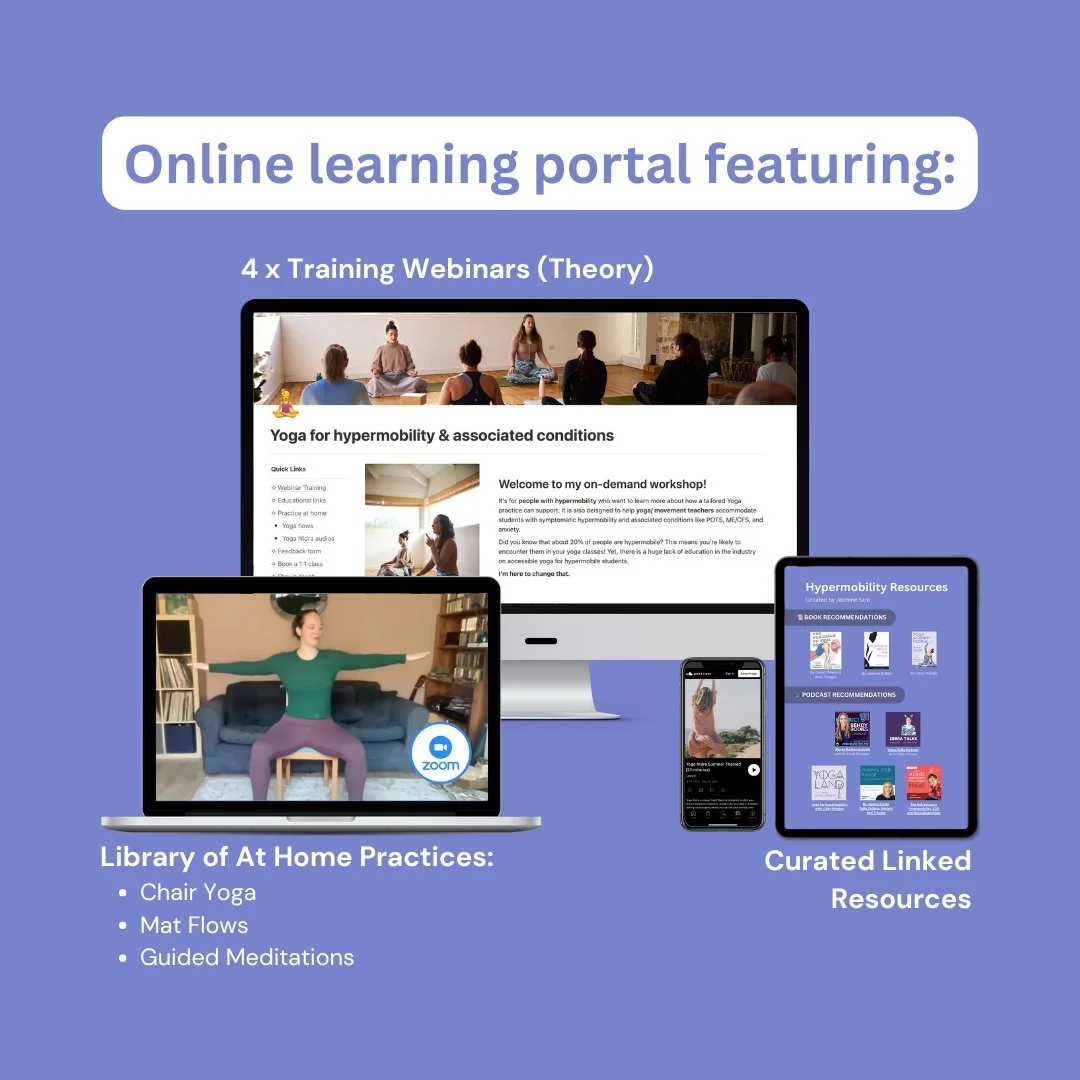On-demand training
Yoga for hybermobility and associated conditions
For hypermobile people to support their own Yoga/ movement practice. And for Yoga teachers, pilates instructors, fitness coaches, and movement therapists to learn how to support their hypermobile students.
It’s a self-paced online training with around 2 hours of pre-recorded theory videos, a library of at-home yoga practices, and an optional live Zoom session in June. It explores hypermobility syndromes and common co-occurring conditions, and teaches you how to adapt yoga and relaxation practices to create a supportive, accessible approach for hypermobile bodies.
“Hypermobility and EDS are so poorly understood, and this training raised awareness and looked to improve accessibility in classes. Jasmine is really knowledgeable and this is such important work that I'd love more people to learn from.” - Yoga student
Participant feedback
What is hypermobility?
Hypermobility refers to joints moving beyond their typical range of motion. While some people have naturally hypermobile joints without issues, for others, it’s associated with conditions like Ehlers-Danlos Syndromes (EDS) or Hypermobility Spectrum Disorder (HSD). These conditions can often come with a range of co-occurring challenges, including chronic pain, fatigue, joint instability, gastrointestinal issues, and autonomic dysfunction.
Symptomatic hypermobility and related chronic health conditions are prevalent in the yoga community, where flexibility is often glorified but misunderstood. Many hypermobile people are drawn to yoga, but without proper education and awareness, the practice can lead to injury or flare-ups.
This training aims to raise awareness in the yoga/ movement industry, equipping teachers and students with the tools to deepen their knowledge, prioritise access needs, and adapt practices to support hypermobile folk.
Hypermobility awareness in yoga
What will this training teach me?
What hypermobility is; an introduction to EDS & HSD, and their common associated co-occuring conditions.
Movement, breath, and relaxation principles to integrate into your classes/ practice.
How to avoid common ways of practicing Yoga that can irritate the hypermobile body so you can confidently adapt.
How to accommodate hypermobile folk in your Yoga classes (either for yourself if you're hypermobile, or for students if you’re a teacher)
A clearer understanding of how hypermobility can impact a person and the ways Yoga can support.
This training combines Jasmine’s 8 years experience teaching Yoga with further training such as thr evidence based Integral Movement Method developed by hypermobility specialist Jeannie Di Bon.
Who is this training for?
Participant feedback
“I really appreciated all the work and effort that went into providing the training. It was perfect, really informative! Highly tailored information to address the physical needs of people who are hypermobile, which is often overlooked. I learned the importance of not pushing oneself.” - Roisin, Occupational therapist
Accessibility
As someone with Hypermobile Ehlers Danlos Syndrome, this training combines my personal lived experience with my professional expertise in teaching yoga specifically for hypermobility. I am also neurodivergent and manage other health conditions associated with my hypermobility so it’s really important to me to ensure all my offerings accommodate different needs.
Pricing
Full price: £55 (This is the rate I have set to support my work)
Concession rate: £25 (If the full rate is not at all an option for you)
Self-Employed Yoga Teachers, fitness coaches, Pilates instructors etc: Remember, you can list this online training as a business expense!
Participant feedback
“Super informative training and great yoga classes too! I left feeling like I'd learnt a lot - thank you!”
- Helen, Yoga Teacher
Our services
-

In-person workshops
I’m planning to host in-person and online workshops throughout 2025. Sign up here if you would like to be notified on upcoming dates.
-

Book me in for your YTT
Looking to make your yoga teacher training more accessible and inclusive? I can help with that! Get in touch with me here to find out more.
Participant feedback
“I was fascinated by how many other things hypermobility is related to, and also the simple ways to modify yoga practice to help hypermobility.” - Julia, Myofascial Release Therapist
Further learning resources
-

Holistic Aquila podcast
Listen to this episode of Holistic Aquila where I discuss navigating wellness spaces with chronic illness along with hypermobility and associated conditions in movement-based practices.
-

Read my blog
If you would like to learn more about my hEDS story, check out this blog article which explores how 10 seemingly unrelated health issues led to my Hypermobile EDS diagnosis.








